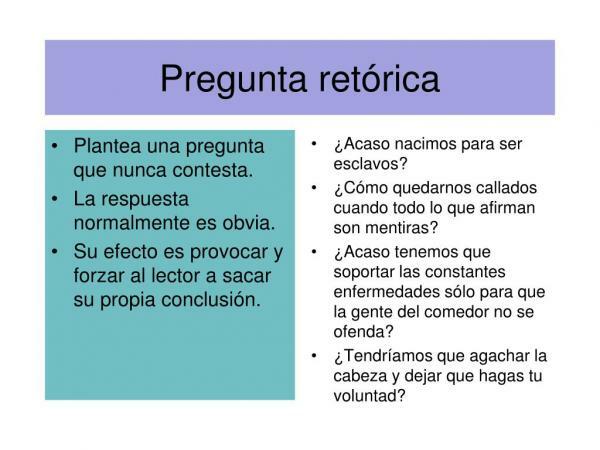Rhetorical questions: meaning and examples

Image: Slideshare
Questions are essential when it comes to communicating. If we did not ask ourselves things, we could not know. As Aristotle said: "Doubt is the beginning of wisdom." So that you do not stay with the desire to learn, in this lesson from a TEACHER we are going to focus on this issue, specifically on the rhetorical questions, their meaning and examples so that you know how to identify one of them as soon as they formulate it or read it. Are you ready?
Index
- What are rhetorical questions
- When are rhetorical questions used?
- Examples of rhetorical questions
What are rhetorical questions.
The questions are formulated with the aim of interpellate to another person and that this give us the response to the information we are looking for. It is born from a doubt of its own that wants to be satisfied by the message that our interlocutor indicates. The questions can be many, as many as information you want to know:
- What time is it?
- What is there to eat?
- Could you tell me where to get to the Tourist office?
- Where are my keys?
But there are other types of questions that they don't wait for an answer, this is the case with rhetorical questions. These are those whose objective is not to show a doubt and question the receiver of the same for an explanation or answer to the matter raised. Its purpose is none other than that of show more emphasis on the question or affirm through said question a fact.
The rhetorical question is also known as erothema or rhetorical interrogation and he is a literary figure. He is not looking for an answer since this is implicit in the way the question in question has been formulated. That is, a point of view or an idea is implied that makes the question work as a suggestion, a statement, or simply highlights the emphasis of the question.
Rhetorical questions are often used in argumentative texts simulating a dialogue between sender and receiver. In these texts, in particular, the persuasion of the receiver is sought to change his point of view or reflect.

When are rhetorical questions used?
In the previous section we have already pointed out some functionalities of rhetorical questions, but they have many more uses. Although it is a literary figure, we usually use it more than we think in our day to day, whether in written or spoken language. Thus, rhetorical questions are used in:
- Closing an oral speech: To end an oral speech, a rhetorical question can be used, so that a conclusion is raised to it. Through it, the listener's reflection is invited, awakening doubts and concerns.
- Critical comment: irony is one of the main uses of rhetorical questions as it can be used to show certain statements that can be unpleasant in a more cosmetic way.
- When you want to scold someone: In colloquial language, this use is very common since rhetorical questions are very frequent when we want to scold someone or we want to pose a challenge.
- An argumentation: it is not intended that the interlocutor thinks of an answer to the question posed by the issuer, rather, it generates an argument that serves to support what the discourse is trying to do. to transmit.
Examples of rhetorical questions.
We have already seen what rhetorical questions are and what uses they have in language. As you have seen, despite the fact that it is a Literary figure especially used in argumentative speeches, the truth is that it can be used in more situations than you thought. Surely without realizing it you have formulated, or have been formulated some of them. Here we offer you a series of examples of rhetorical questions that will help you better understand what rhetorical questions are and how they are used:
- How long do I have to wait for you to pick up your toys?
- Where has your illusion and will to live?
- What Am I doing with my life?
- At what point did you lose your passion for his work?
- Do I need to say what I think?
- How did I not pay the last bill?
- Why does everything bad always happen to the neediest people?
- Do you think I'm stupid?
- How many times do I have to tell you not to go with those people?
- Who is going to believe you after what you did to your family?
- How could you do that to your best friend?
- Can you shut up for a moment?
- Could someone explain to me what all the laughter comes to?
- Who would not dream of a trip like the one he received for his birthday?
- Shouldn't we help those in need?
- Who is going to put up with that character?
- When will our bad luck end?
- How long are we going to have to wait for the landlord to repair our hot water?
- Do you call this justice?
- What are you doing with your life?
- Is it really convenient for you to continue like this?
We hope that you have been able to solve your doubts about rhetorical questions thanks to its definition and the examples that we have raised. Now it will be much easier for you to identify and use them correctly.

Image: Lifeder
If you want to read more articles similar to Rhetorical questions: meaning and examples, we recommend that you enter our category of Grammar and Linguistics.


